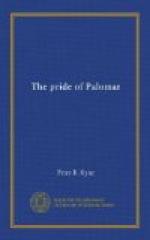“I believe,” Parker stuck in, as Don Miguel ceased from his passionate denunciation, “that all this is leading quite naturally to a discussion of Japanese emigration.”
“I admit that the sight of Mr. Okada over in the corner of the patio, examining with interest the only sweet-lime tree in North America, inspired my outburst,” Farrel answered smilingly.
“You speak of our national shibboleths, Don Mike Farrel,” Kay reminded him. “If you please, what might they be?”
“You will recognize them instantly, Miss Parker. Let us start with our Declaration of Independence: ‘All men are created equal.’ Ah, if the framers of that great document had only written, ’All men are created theoretically equal!’ For all men are not morally, intellectually, or commercially equal: For instance, Pablo is equal with me before the law, although I hazard the guess that if he and I should commit a murder, Pablo would be hanged and I would be sentenced to life imprisonment; eventually, I might be pardoned or paroled. Are you willing to admit that Pablo Artelan is not my equal?” he challenged suddenly.
“Certainly!” Kay and her father both cried in unison.
“Very well. Is Mr. Okada my equal?”
“He is Pablo’s superior,” Parker felt impelled to declare.
“He is not your equal,” Kay declared firmly. “Dad, you’re begging the question.”
“We-ll, no,” he assented, “Not from the Anglo-Saxon point of view. He is, however, from the point of view of his own nationals.”
“Two parallel lines continued into infinity will never meet, Mr. Parker. I am a believer in Asia for Asiatics, and, in Japan, I am willing to accord a Jap equality with me. In my own country, however, I would deny him citizenship, by any right whatsoever, even by birth, I would deny him the right to lease or own land for agricultural or other purposes, although I would accord him office and warehouse space to carry on legitimate commerce. The Jap does




